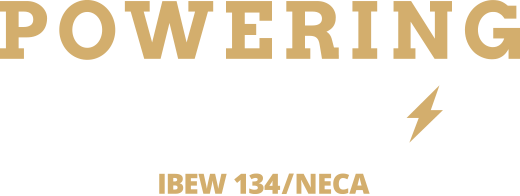Addressing Underrepresentation in Trade Apprenticeships Requires Industrywide Action
- Posted: March 30, 2020
- apprenticeship programs, better careers, better communities, IBEW-NECA Technical Institute
In February, Crain’s Chicago Business posted an article inaccurately describing the tired narrative that construction apprenticeship programs are only filled by white men. The article details how Illinois and other states have more white males in construction apprenticeship programs than any other race or gender, but what the article fails to detail are the steps taken by Powering Chicago and other construction trades to combat this longstanding issue.
Below is a letter to the editor written by IBEW Local 134 Business Manager Don Finn describing the work that Powering Chicago electricians and contractors are doing — along with other union construction trades — to build a more inclusive work environment and reach out to underserved areas of Chicago.
Addressing Underrepresentation in Trade Apprenticeships Requires Industrywide Action
Crain’s highlighted the challenges women and minorities face securing apprenticeships in the Chicago area, the vast majority of which are offered by the building trades (“Even apprenticeships are hard to come by for women and minorities,” Crain’s Forum, Feb. 27). The data, which shows that white men continue to hold an outsized percentage of apprenticeships in our state, underscores the pressing need for change that increases opportunities for underserved populations to access apprenticeships and gain the skills needed to secure stable, sustainable, and well-paying jobs that are the foundation of a healthy middle class.
What the data doesn’t show, however, is the progress that’s been made in recent years to create apprenticeship opportunities that are accessible based on a person’s willingness to put in the effort and their aptitude for the trade. Gone are the days when apprenticeships are given to an individual based on who they know. If we as a city are to address the pervasive underrepresentation of women and minorities in the building trades, it’s important to recognize what’s working and apply these methods throughout the sector.
In metro Chicago, IBEW Local 134 and its union contractors sponsor an apprenticeship program at the IBEW-NECA Technical Institute, with campuses in Chicago and the south suburbs. At the institute, a point system takes into account candidates’ work history and experience, with consideration given for high school classes that develop skills that can be applied in the construction industry. Additional points are awarded based on an aptitude test developed by a third-party industrial psychologist that accurately predicts candidates’ likelihood of success in the program. Each candidate is then ranked based on their comparative scores within the applicant pool, and any subjectivity from the process is eliminated.
There’s more work to be done, but this merit-based apprenticeship system represents thousands of job opportunities for female and minority candidates that have not existed in the past when subjectivity influenced an applicant’s candidacy.
Equally important are extensive outreach programs to underserved communities dedicated to minority inclusion. Significant time, energy, and resources from the building trades are devoted to reaching potential candidates for apprenticeships where these applicants live, whether in underserved areas of Chicago, in high school classrooms, church-sponsored events, adult-based job readiness programs, or career fairs.
This outreach can take many forms, like the construction career expo hosted on Chicago’s South Side each year by trade and community groups. This specific event brings the expo to neighborhoods that may otherwise not know those careers are available. Mobile outreach with specialized vehicles that are designed to provide demonstrations to prospective candidates is also utilized to easily bring the trades to prospective workers.
To reach high school students, programs like Chicago Builds offer Chicago Public Schools juniors and seniors access to a number of trades by meeting five days a week at Dunbar High School, directly next to the IBEW Local 134 Union Hall in the Bronzeville community. It’s here that students receive training in electricity, carpentry, heating and cooling, welding, and general construction, providing them with the technical skills and experience needed to succeed as apprentices. Increased investment by the trades in such programs is an invaluable method to ensure that the door to apprenticeship is open to all.
Increasing opportunities for women and minority candidates to join apprenticeship programs and advance to careers in the unionized trades should remain a top priority for all trades to ensure stronger communities while strengthening the Chicago area and better leveraging the talents of all its citizens.
DON FINN
Business manager, IBEW Local 134

